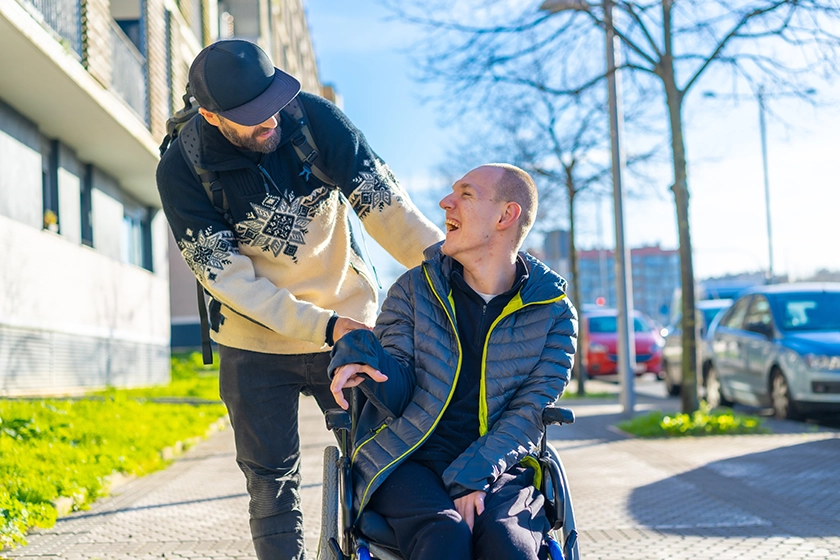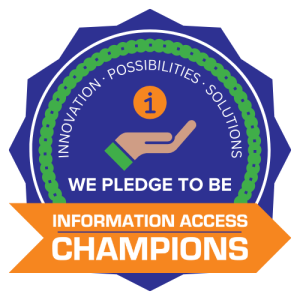Public Guardianship for Individuals with Intellectual and Developmental Disabilities
What is Public Guardianship?
Public Guardianship is the court ordered appointment of a public agency to make decisions on the behalf of a person diagnosed with a developmental disability who is believed to be incapacitated, indigent, and in need of someone to make decisions for them.
How do I obtain a public guardian?
DBHDS, in partnership with the Department for Aging and Rehabilitative Services (DARS), has developed a detailed process for receiving and managing requests for guardianship. A Community Services Board (CSB) Support Coordinator (SC) is responsible for initiating the process when an individual is encountered who is believed to be in need of this support. The CSB SC must complete the DBHDS referral form and submit it, along with the most recent capacity evaluation, to Public.guardianship@DBHDS.virginia.gov.
What if there is a change in the individual’s circumstances after the referral is submitted?
If at any point the CSB SC obtains information that would indicate the individual is inappropriate for public guardianship, or if there is a change in the information provided to DBHDS as part of the initial referral, the CSB SC must notify DBHDS by completing a Public Guardianship Change Form and submitting it to Public.guardianship@DBHDS.virginia.gov.
Is there funding available to assist with the process of obtaining a public guardian?
The CSB SC may request reimbursement for the actual cost of attorney fees, up to $2,000, by completing the DD Guardianship Request for Funding form. The Request is subject to approval and availability of funds.
Who do I contact for assistance?
If you are a Support Coordinator, please send your questions and inquiries to public.guardianship@dbhds.virginia.gov
If you or someone you know is in need of this service, please contact your local Community Services Board or Behavioral Health Authority.
th, td {border: 1px solid;}
Community Services Board/Behavioral Health Authority | Locations Served | Main Number |
ALEXANDRIA CSB | City of Alexandria | (703) 746-3400 |
ALLEGHANY HIGHLANDS CSB | Alleghany County; City of Covington, towns of Clifton Forge & Iron Gate | (540) 965-2135 |
ARLINGTON COUNTY CSB | Arlington County | (703) 228-5150 |
BLUE RIDGE BEHAVIORAL HEALTHCARE | Botetourt, Craig, & Roanoke Counties; Cities of Roanoke & Salem | (540) 345-9841 |
CHESAPEAKE INTEGRATED BEHAVIORAL HEALTHCARE | City of Chesapeake | (757) 547-9334 |
CHESTERFIELD CSB – REGION | County of Chesterfield | (804) 748-1227 |
COLONIAL BEHAVIORAL HEALTH | James City & York Counties; Cities of Poquoson & Williamsburg | (757) 220-3200 |
CROSSROADS CSB | Amelia, Buckingham, Charlotte, Cumberland, Lunenburg, Nottoway, & Prince Edward Counties | (434) 392-7049 |
CUMBERLAND MOUNTAIN CSB | Buchanan, Russell, & Tazewell Counties | (276) 964-6702 |
DANVILLE-PITTSYLVANIA CSB | Pittsylvania County; City of Danville | (434) 799-0456 |
DICKENSON COUNTY BEHAVIORAL HEALTH | Dickenson County | (276) 926-1680 |
DISTRICT 19 CSB | Dinwiddie, Greensville, Prince George, Surry & Sussex Counties; Cities of Colonial Heights, Emporia, Hopewell, & Petersburg | (804) 862-8002 |
EASTERN SHORE CSB | Accomack & Northampton Counties | (757) 442-3636 |
FAIRFAX-FALLS CHURCH CSB | Fairfax County; Cities of Fairfax & Falls Church | (703) 324-7000 |
GOOCHLAND- | Counties of Goochland & Powhatan | (804) 556-5400 |
HAMPTON-NEWPORT NEWS CSB | Cities of Hampton & Newport News | (757) 788-0300 |
HANOVER CSB | County of Hanover | (804) 365-4222 |
HARRISONBURG-ROCKINGHAM CSB | City of Harrisonburg; County of Rockingham | (540) 434-1941 |
HENRICO AREA MENTAL HEALTH AND DEVELOPMENTAL | Charles City, Henrico, & New Kent Counties | (804) 727-8500 |
HIGHLANDS CSB | Washington County & City of Bristol | (276) 525-1550 |
HORIZON BEHAVIORAL HEALTH | Amherst, Appomattox, Bedford, & Campbell Counties; City of Lynchburg | (434) 847-8050 |
LOUDOUN COUNTY DEPARTMENT OF MENTAL HEALTH, SUBSTANCE ABUSE and DEVELOPMENTAL SERVICES | County of Loudoun | (703) 777-0378 |
MIDDLE PENINSULA-NORTHERN NECK CSB | Essex, Gloucester, King & Queen, King William, Lancaster, Mathews, Middlesex, Northumberland, Richmond, & Westmoreland Counties | (804) 758-5314 |
MOUNT ROGERS COMMUNITY SERVICES | Bland, Carroll, Grayson, Smyth, & Wythe Counties; City of Galax | (276) 223-3200 |
NEW RIVER VALLEY CSB | Floyd, Giles, Montgomery, & Pulaski Counties; City of Radford | (540) 961-8300 |
NORFOLK CSB | City of Norfolk | (757) 823-1600 |
NORTHWESTERN | Clarke, Frederick, Page, Shenandoah, & Warren Counties; City of Winchester | (540) 636-4250 |
PIEDMONT CSB | Franklin, Henry, & Patrick Counties; City of Martinsville | (276) 632-7128 |
PLANNING DISTRICT ONE BEHAVIORAL HEALTH SERVICE | Lee, Scott, & Wise Counties; City of Norton | (276) 679-5751 |
CITY OF PORTSMOUTH DEPT. OF BEHAVIORAL HEALTHCARE SERVICES | City of Portsmouth | (757) 393-8618 |
PRINCE WILLIAM COUNTY CSB | County of Prince William; Cities of Manassas & Manassas Park | (703) 792-7800 |
RAPPAHANNOCK AREA CSB | Caroline, King George, Spotsylvania, & Stafford Counties; City of Fredericksburg | (540) 373-3223 |
RAPPAHANNOCK-RAPIDAN CSB | Culpeper, Fauquier, Madison, Orange, & Rappahannock Counties | (540) 825-3100 |
REGION TEN CSB | Albemarle, Fluvanna, Greene, Louisa, & Nelson Counties; City of Charlottesville | (434) 972-1800 |
RICHMOND BEHAVIORAL HEALTH | City of Richmond | (804) 819-4000 |
ROCKBRIDGE AREA | Bath & Rockbridge Counties; Cities of Buena Vista & Lexington | (540) 463-3141 |
SOUTHSIDE CSB | Brunswick, Halifax, and Mecklenburg Counties | (434)-572-6916 |
VALLEY CSB | Augusta & Highland Counties; Cities of Staunton & Waynesboro | (540) 887-3200 |
VIRGINIA BEACH HUMAN SERVICES CSB | City of Virginia Beach | (757) 385-0602 |
WESTERN TIDEWATER CSB | Isle of Wight & Southampton Counties; Cities of Franklin & Suffolk | (757) 966-2805 |






